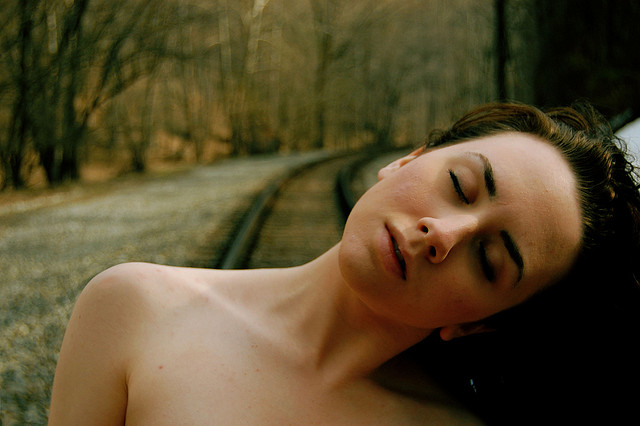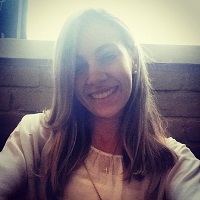
It happens every year, as the seasonal sunshine wafts into my consciousness—and I remember.
“Did you make it to the Milky Way to see the lights all faded, and that heaven is overrated?”
I am almost 13 years old, and my after school regimen is set in stone. I walk home every day from my nearby middle school, make myself Easy Mac, and watch “Total Request Live with Carson Daly” on MTV.
I get my cheese fix, eyes glued to the music videos blasting on the screen. My favorite song, at this time, is “Drops of Jupiter” by Train. I listen to it over and over, and tears roll down my face. I do not understand why I cry, or why the emptiness inside throbs around my heart strings.
My days are slow and boring, and my weekends are lonely. While other students plan end-of-school pool parties and spring sleepovers, I think about why some things are so beautiful and why others are so sad—and why there is a void in my soul—and I cry.
“Tell me, did you fall for a shooting star—
One without a permanent scar?”
My liposuction-obsessed nutrition teacher has a new assignment for our 7th grade class—record your food intake for a full day, and we will receive print out how our eating habits align with how we should be eating.
I am terrified for this day, just as I was terrified for a public weighing in gym class just a year earlier.
This is my chance, I tell myself. I want to show that I don’t have to eat Easy Mac every day—that I can forgo all snacks for sucking hard candy. Just for this day. I still remember that day, and the discipline it took to do what would later become second-nature—restriction.
The print out of my nutritional intake comes back, and it is affirmed that I had not eaten enough for the day. My reaction to this finding—relief. A deep sigh of relief that for one day I controlled my pre-pubescent hunger pangs. I am proud of myself, and I feel productive—much more productive than I’ve ever felt getting As in school. For the first time, I feel worthy.
The restriction doesn’t stick, because my body is growing rapidly, and I let myself honor my healthy appetite. But I will always remember this day.
“And tell me, did Venus blow your mind?
Was it everything you wanted to find?”
I decide in the spring to go on a “diet.”
Or more practically, I want to eat less at parties. I start trying to manipulate my food intake, and it blows up in my face.
I restrict myself to only to consume large amounts of sweets at parties, because I am so hungry from restricting. I grow increasingly frustrated at myself. I don’t want to be that person who gorges herself at get-togethers with friends. I start using the word “fat” in my deprecating self-talk.
I want to be in control.
I don’t want to get “fat,” and get made fun of for my weight, like other girls in my grade. I devote all my time and energy into making my “diet” work. I become obsessed with controlling my food intake. It doesn’t happen right away, but I am meandering—puttering around a black hole, and eventually, I fall into it.
The diet doesn’t stick.
Anorexia does.
“And did you miss me while you were looking for yourself out there?”
I fall hard and fast. Within only a month, a cluster-f*ck of genes and environment have culminated in the worst way—my genetic predisposition, personality characteristics, life stressors and environmental/social/spiritual issues brew the perfect storm for anorexia’s sneaky suction cup into my life.
I know nothing about anorexia, but I am addicted to whatever it is that is happening to me. My life feels more manageable and safe. My inner loneliness is traded for obsessing about cookbooks, and trying to force other people to eat.
Emotional pain is replaced with constant fatigue—to the point that I wonder if I have contracted mono.
I no longer worry about parties or friends or being a failure. I am too tired, so I don’t give a sh*t about anything.
All that matters is the scale, my weight and my food intake.
I no longer cry. I no longer feel—and I like it.
It will change my life. It will ruin my life.
It will almost kill me. But right now—in my 13-year-old starvation “high”—I like this.
“Can you imagine no love, pride, deep-fried chicken?
Your best friend always sticking up for you even when I know you’re wrong
Can you imagine no first dance, freeze dried romance, five-hour phone conversation?
The best soy latte that you ever had and me…”
Fourteen years have passed since that season of my life, but those years have been filled with suffering and scars to show for the wear and tear.
My body is weaker and has accumulated some permanent damage.
The worst thing I hear people say to me is that they wish they had my “self-control” in regards to eating. They have no idea what they are saying.
Yes, my eating disorder resulted in weight loss—but at the expense of what?
I didn’t have late nights spent with friends in high school. In fact, the day of my high school graduation ceremony, I was too hazy to remember anything, except for my internal debate about eating a snack.
The month before I graduated from college, I was medically withdrawn and sent to treatment. Hours and hours, days and days, years and over a decade were lost of my life.
I didn’t have meaningful teenage memories. No five hour phone conversations with crushes. No staying out late. No eating out. Nothing fun was able to penetrate my stone wall of isolation and anorexia. For that I mourn.
“And now you’re lonely looking for yourself out there.”
Even now, chills run up and down my spine when I hear the song “Drops of Jupiter.” I am haunted by the memory of a 13-year-old girl, barely a teenager, whose aching, throbbing soul wanted purpose and meaning—and also macaroni and cheese.
Years after I developed anorexia, I started my healing process on a ranch in Arizona, of all places. In treatment, I learned that it is okay to eat salads, but it is equally okay to eat cake. I was unconditionally loved and accepted in all my brokenness. The relationships that I developed sustained me and showed me that I had an identity apart from my eating disorder.
I also learned that I needed to get to know the existentially empty, angsty, anxious, insecure 13-year-old that is inside of me.
The process of recovering from an eating disorder is imperfect and rocky. After years of pouring all I have into this journey, I wish that I could say I’ve fully wiped my hands of anorexia, and it is completely in the past.
The reality is that the road to recovery is a winding labyrinth, and I am not yet out of that labyrinth.
I can’t remember what it is like to eat, without thinking about what I am eating. It is hard not to mentally tally calories when I spent over a decade memorizing the calories of every single food product ever invented.
I hope that someday my default response to stress will be to pull out a good book, or do some deep breathing, rather than the instantaneous craving to starve. I hope that someday I can eat a cookie without my mind analyzing the fact that I’ve eaten a cookie.
Although I have a ways to go, I am no longer a lonely wanderer.
I have experienced love—genuine, raw love—that has healed rooms of my heart that were in vacant and lonely. I get glimpses of happiness—moments when the sun shines, when I see my therapist, and as I celebrate a birthday with cake.
Sometimes, more and more often, I believe I am enough.
Despite all the wounds and scars, from a journey I never wanted to have, I am healing.
Anorexia has been my past, and its lingering effects still impact me today, but it is not my future. There is life after an eating disorder.
Out of the ashes and tattered ruins of brokenness, I have to believe that something beautiful will arise.
.
Relephant:
What it Means to Love a Wild-Hearted Woman.
.
Author: Charlotte Sandy
Editor: Yoli Ramazzina
Photo: Flickr/Jenavieve











Read 1 comment and reply